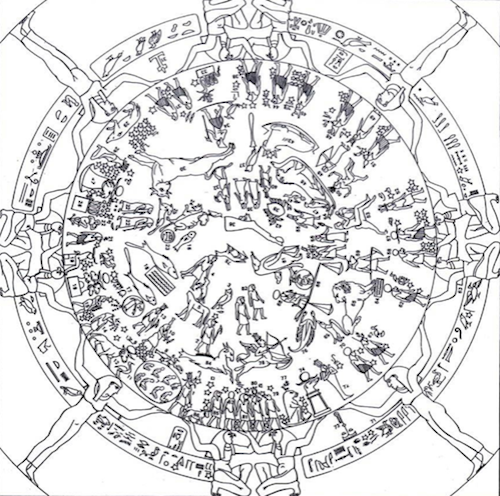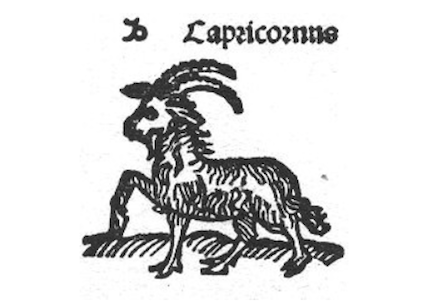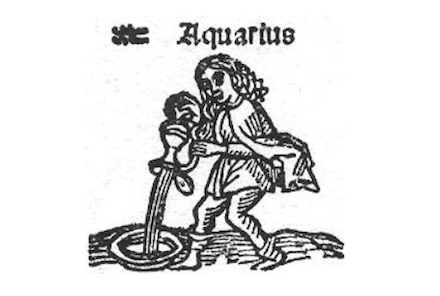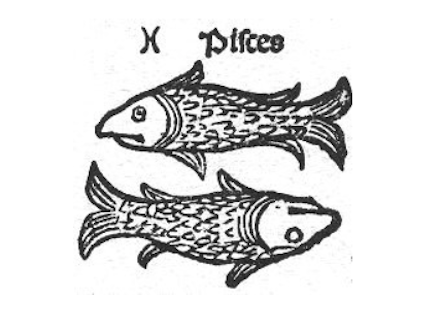Stars, Poetry—Part IV: Capricorn, Aquarius, and Pisces
BY Hoa Nguyen

I wrote through the zodiac! This is my last meditation on a personal wheel of poetic influence, grouped by astrological modalities. (See here for my first one; here is my second one; here is my third report).
What Are the Modalities of the Zodiac? A Review below:
Cardinal signs initiate action. The Sun’s entry into these signs coincides with the equinoxes and solstices. Cardinal signs are direct, assertive, forceful, and enterprising.
Fixed signs stabilize and secure the energy begun by the Cardinal signs. Fixed signs represent determination, power, striving after set goals, pride, and reliability.
Mutable signs adapt and disperse the element. Mutable signs are suggestible, resourceful, flexible, drawn to variety, and move with change.

Capricorn:
Cardinal Earth
Ruled by Saturn
December 22 – January 20
Tarot: The Devil
Like all earth signs, Capricorns are known to be practical, dedicated, and industrious. Capricorns are also known for their ambition and leadership abilities (this is a common aspect of the Cardinal nature).
For this clan, I will focus on two Capricorn poets that knew and influenced each other, Charles Olson (December 27) and Robert Duncan (January 7).
When Olson and Duncan met for the first time in 1947, Duncan was delighted to find that they both were interested in the Greek idea of temenos:
I was interested in totally coordinating a time-space picture of the Earth, then zeroing in at some point of it, and so was he”, Duncan has recalled. “That day I talked to him about the economic relation of cities to the surrounding landscape. It turns out he’d been thinking about the same thing himself… He wanted to know about the Greek idea of temenos, which I explained to him. He’d just been back to Gloucester, talking to the fishermen. Even then the question of what it means to have a sacred place or precinct obviously interested him. And of course it would be the question for him—the whole problem of how to cultivate one’s own locality into writing.
—from The Allegory of a Poet’s Life, a biography of Charles Olson by Tom Clark, page 126.
I find it interesting that temenos also resonates with Jungian thought referring to the sacred place where the unconscious can roam freely as with dreaming. Temenos is figured as the “circle in the square,” like a picture of the spirit of existence (“soul” cross-culturally depicted as a circle or wheel) inside of place—a square as the “four cornered earth”: the points in the sky with respect to where the sun rises for the winter and summer solstice and the spring and fall equinoxes.
I love this poem by Olson that features dreams, Duncan, and an earthy gem situated squarely in the human occupation of place (from The Maximus Poems):
I am the Gold Machine and now I have trenched out,
smeared, occupied
with my elongated length the ugliest passage of all the V
running from the Rest House down the hill to the
Tennis Court, the uncontaminated land which of all Stage
Fort
does not bend or warp into new expressions
of itself as De Sitter imagined the Universe a
rubber face or elastic bands falling
into emergent lines from which string the crab-apple
tree is a dollyop on the lawn of the Morse house over
Western AvenueThrough the gate in a door of a cell
inside which about where the Rest House is another man
and I were I had then in my hand a wooden page or block
of which a long red drop and I wished
so strongly to show right away to Robert Duncan
and another who were walking away down the V and shot it
into the space of the door which it exactly fitted
and they turned, and saw it, and went on and taking
the block out of the window stuck my fingers vertically
through the same hole or grating and waved by moving
my fingers at them where they were towards the
Tennis CourtsThe land was relieved. I had drawn my length all this way
and had covered this place too
In Olson’s "Projective Verse," he speaks of Composition by Field “where all the syllables and all the lines must be managed in their relations to each other.” This compositional model would influence Duncan’s poetry appearing in his book The Opening of the Field. Here is Robert Duncan in a lecture on Charles Olson’s poetics at New College, San Francisco 17 February 1982:
(Olson) had the term Field Composition which I’d seen before and thought about in relation to paintings because the Gestaltists had advanced the idea of the Field Composition of paintings—that intention does not move pointedly around a painting—that the eye actually rediscovers the painting with different paths—and you look at a painting somehow entire and look deep into it—and then the great question came up right away for the Gestaltists: don’t we read the same way, scan the entire area we’re reading, and then read into it, so that we’re already in an advanced state of recognition without much time passing at all as we discover it, but the discovery comes from a Field Scan of the whole area.
Composition by Field is a procedural acknowledgement to how, as readers, we encounter sense nuggets in a Gestalt; that is, in arrays or patterns—certainly not as letters, syllables or event sense chunks, but as one might apprehend a painting, the eye taking in and processing the visual field as parts of a whole. I love that it takes two earth sign to relate writing to a “field.”
I shall depart from the Capricorn clan with the opening movement of a poem from Duncan’s Opening of the Field that speaks to the sense of temenos…
“Often I Am Permitted to Return to a Meadow”
as if it were a scene made-up by the mind,
that is not mine, but is a made place,that is mine, it is so near to the heart,
an eternal pasture folded in all thought
so that there is a hall thereinthat is a made place, created by light
wherefrom the shadows that are forms fall.

Aquarius
Fixed Air
Ruled by Uranus
January 21 – February 19
Tarot: The Star
Aquarians are known to be inventive thinkers, “ahead of their time,” and eccentric. They are the “mad scientists” of the zodiac with brilliant, quirky, and analytical mind. As the water bearers, they love giving idea-gifts that they think are a boon to humanity. It’s no wonder that as we entered the “Age of Aquarius,” we have experienced advancing and ever-more-rapid methods of communications that are designed to bring human beings closer to each other (and which ironically, may serve to isolate us further from each other—perhaps a sidelong reflection of the notorious Aquarian “aloofness”?). Their catch phrase is “I know…” Also, hairstyle: they say that the dead giveaway for Aquarians is their hair flair.
Gertrude Stein (February 3) was such a classic Aquarian: original, unusual, and genius. When William Carlos Williams heard Stein read in the US in 1933, he remarked that her language was “smashing every connotation that words ever had in order to get them back clean.” Like many Aquarians, Stein was focused and experimental. Stein on her writing:
Every word I write has the same passionate exactness of meaning that it is supposed to have. Everything I write means exactly what it says.
This passage reminds me of her relationship with the philosopher Alfred North Whitehead (a fellow Aquarian who she read and with whom she was friends) and of his writings on Process Philosophy:
Process philosophy is characterized by an attempt to reconcile the diverse intuitions found in human experience (such as religious, scientific, and aesthetic) into a coherent holistic scheme. Process philosophy seeks a return to a neo-classical realism that avoids subjectivism. This reconciliation of the intuitions of objectivity and subjectivity, with a concern for scientific findings, produces the explicitly metaphysical speculation that the world, at its most fundamental level, is made up of momentary events of experience rather than enduring material substances. Process philosophy speculates that these momentary events, called “actual occasions” or “actual entities,” are essentially self-determining, experiential, and internally related to each other.
For this segment, I want to interview the late Jack Spicer (January 30), a poet who was known to invent poems for, by, and with ghosts.
Hoa Nguyen: Hi Jack; I hope it’s okay to call you Jack? I’m also a January Aquarius, by the way! Anyway, I’m wondering if you could tell me a little bit more about your statement, "Poetry—a machine to catch ghosts"
Jack Spicer: I like the idea (Aquarians always LOVE ideas) that there are these big eternal shapes that lie outside of us. Why do you think I chose Lorca as a correspondent? He was so dead and yet so alive! Didn’t he say “A dead man in Spain is more alive when dead than anywhere else on earth”?
I’ll say it again: nothing matters except the big lie of the personal—the lie in which these objects do not believe—and the encysted emotion will itself become an object to be transferred at last into poetry like the waves and the birds. By making poems into ghost catching machines, we’ll finally realize invented particularities.HN: Is that what you mean by “a kind of magic, kinded them”?
JS: Yes, exactly, and also:
“yestestday”
“oldnesses”
“esstoneish me”
“ununderstanding”
“chill-dren”HN: Inventiveness! This reminds me of how poetry means, at its etymological root, to make.
When you wrote “The heart’s a sprinting thing and hammers fast” did you lay it down as iambic pentameter from the first draft, or did you revise the rhythm so that it would be the ‘dum DAH’ of a heartbeat? It seems that even when your poems are not personal per se, they are poignant.
JS: Well you remember that phrase in the Shakespeare sonnet (you quote it so I know you know it): “Was it his spirit, by spirits taught to write”? Any attuned poet can write out of the heartbeat because we listen to that for 9 months inutereo—and it courses ever after. And if you read enough and you listen hard enough the rhythms follow the movement of words. I’ve said it before so I won’t be boring: I transmit messages from elsewhere. I’m a capacitor for received language. I don’t know where it comes from. No one does.
HN: I once had someone give me a kind of psychic reading. She told me that I had many spirits around me and that sometimes when she reads for people, the spirits beg her to tell the person about their existence. Not mine. Mine loved me—told her that I “take great dictation.”
All of this reminds me of an acceptance speech by Leonard Cohen (he’s another air sign, a Libra); he’s accepting the Prince of Asturias Letters Award and says:
Poetry comes from a place that no one commands, that no one conquers. So I feel somewhat like a charlatan to accept an award for an activity which I do not command. In other words, if I knew where the good songs came from I would go there more often.
Do you sometimes feel like a charlatan?
JS: Maybe at this juncture I would write LOL? LOL! Well this word, charlatan, sent me to the etymological dictionary by T. F. Hoad:
Charlatan, mountebank; quack; pretentious imposter… f. ciarlare babble
HN: I don’t find you to be a babbler at all; I think you are being too modest. When I look up mountebank in Hoad I find that it is related to “juggler”—a playful and mercurial (air-sign-related) figure who keeps things moving. Like the fool, a kind an elfish playfulness: I think of you as keeping things aloft in that way, in the way of retrieving messages—keeping words in motion.
JS: Well, I do think “babble” in the way that I purposely want to align with something essential and numinous (as in when I write “poet be like God”)—or maybe I mean aligned with the big GOD and not the later patriarchic “God.” Things do not connect; they correspond.
HN: Skeat says babble is from the M. E. babelen, to prate, mumble, chatter… “to keep on saying ‘ba, ba’ syllables imitates a child’s attempts to speak”
JS: Yes, you start with a syllable machine and see what ghosts you catch. By the way, which do you prefer, Hoad or Skeat?
HN: I prefer both Hoad and Skeat!
[The correspondence descends into geeky Aquarian etymological and classical dictionary chatter…]

Pisces
Mutable Water
Ruled by Jupiter and Neptune
February 20 – March 20
Tarot: The Moon
I always think of Pisces as half-off-the-planet. Apparently, there are more astronauts and dancers that are Piscean than any other sign. They are drawn to inhabiting other worlds and are often interested in mysticism, spirituality, or anything “out of this world.” Pisces have formidable psychic abilities and are extremely intuitive. They are also incredibly emotionally sensitive.
It seems fitting that the tarot card that represents Pisces is the Moon; it is the symbol of the imagination giving form to creative energy. The card also recalls the Piscean other-worldliness. It is the figure of Pisces as crossroads, as being in threshold. As allusiveness, their energy is that of a great mirror, open and receptive.
Highly creative and imaginative, Pisces are often considered the sign of the poet. The egoless nature of Pisces predisposes them, I think, to be poets, as John Keats (a fellow water sign) writes:
A Poet is the most unpoetical of any thing in existence; because he has no Identity—he is continually in for—and filling some other Body.
Two Pisces poets I’d like to consider first were teachers and mentors.
Gloria Frym (February 28)’s devotion to poetry both as a writer and scholar continues to inspire me (see this comparative essay on Dickinson and Lorine Niedecker). When I think back to her teaching, the thing I recall the most was how she seemed to somehow get out of the way while also very clearly leading. With her as teacher and mentor, new discoveries and connections felt natural and intrinsic. She showed me that it is possible to be a woman, teacher, an artist, and a parent. She taught me how to edit and create a poetry journal; she taught me sound pedagogy for a creative writing workshop. A student of Robert Creeley’s, she helped me form my poetry lineage.
Speaking of poetry lineage, I owe much to the poet, scholar, biographer and educator Tom Clark (March 1). I remember when I walked into my first graduate class; it was Clark’s seminar on Ezra Pound. I took every class he offered thereafter: on John Keats, on Sir Thomas Wyatt, Robert Herrick, and Andrew Marvel, on Charles Olson, as well as a collaborative sonnet workshop. He continues to instruct through his blog here. As a poet, his Piscean ability to exit himself and inhabit another body can be seen in his books Empire of Skin (an epic poem on the history of fur trade in the Pacific Northwest beginning with the 18th century) and Junkets on a Sad Planet (a biography in verse on the life of John Keats, some voiced as if coming from Keats himself—a stunning and moving collection).
Finally, I’d like to speak to Theresa Hak Kyung Cha (March 4)’s most acclaimed book Dictee. I find its complexity and slipperiness displays the Piscean ability to diffuse, combine, and channel. As Myung Mi Kim writes on Dictee “[Cha has an] extraordinary sensitivity to the struggle and meaning of acquiring language and attempting its transformative use in a culture which marked her—the speaker—as marginal.” From Dictee:
She moves slowly. Her movements are made gradual, dull, made to extend from inside her, the woman, her, the wife, her walk weighted full to the ground. Stillness that follows when she closes the door. She cannot disturb the atmosphere …
Upon seeing her you know how it was for her. You know how it might have been. You recline, you lapse, you fall, you see before you what you have seen before. Repeated, without your even knowing it. It is you standing there. It is you waiting outside in the summer day. It is you waiting and knowing to wait. How to. Wait. It is you walking a few steps before the man who walks behind you. It is you in the silence through the pines, the hills, who walks exactly three steps behind her. It is you in the silence. His silence all around the unspoken the unheard, the apprenticeship to silence. Observed for so long and not ending. Not immediately. Not soon. Continuing. Contained. Muteness. Speech less ness.
The book figures a confluence of language, identities, and forms. Everything is in motion; the text mixes and permutates. We find translation lessons, Catholic catechism, documents, photos, and movie stills. There are charts, handwriting, letters, and translations. To me, Dictee embodies the Piscean egolessness and their ability to adapt, escape, innovate, and mutate. As the writing includes, it erases. As it identifies, it defies coherence.
Parts I, II, III, and IV can be found here.
Poet Hoa Nguyen was born in the Mekong Delta region of Vietnam and raised in the Washington, D.C., area...
Read Full Biography

